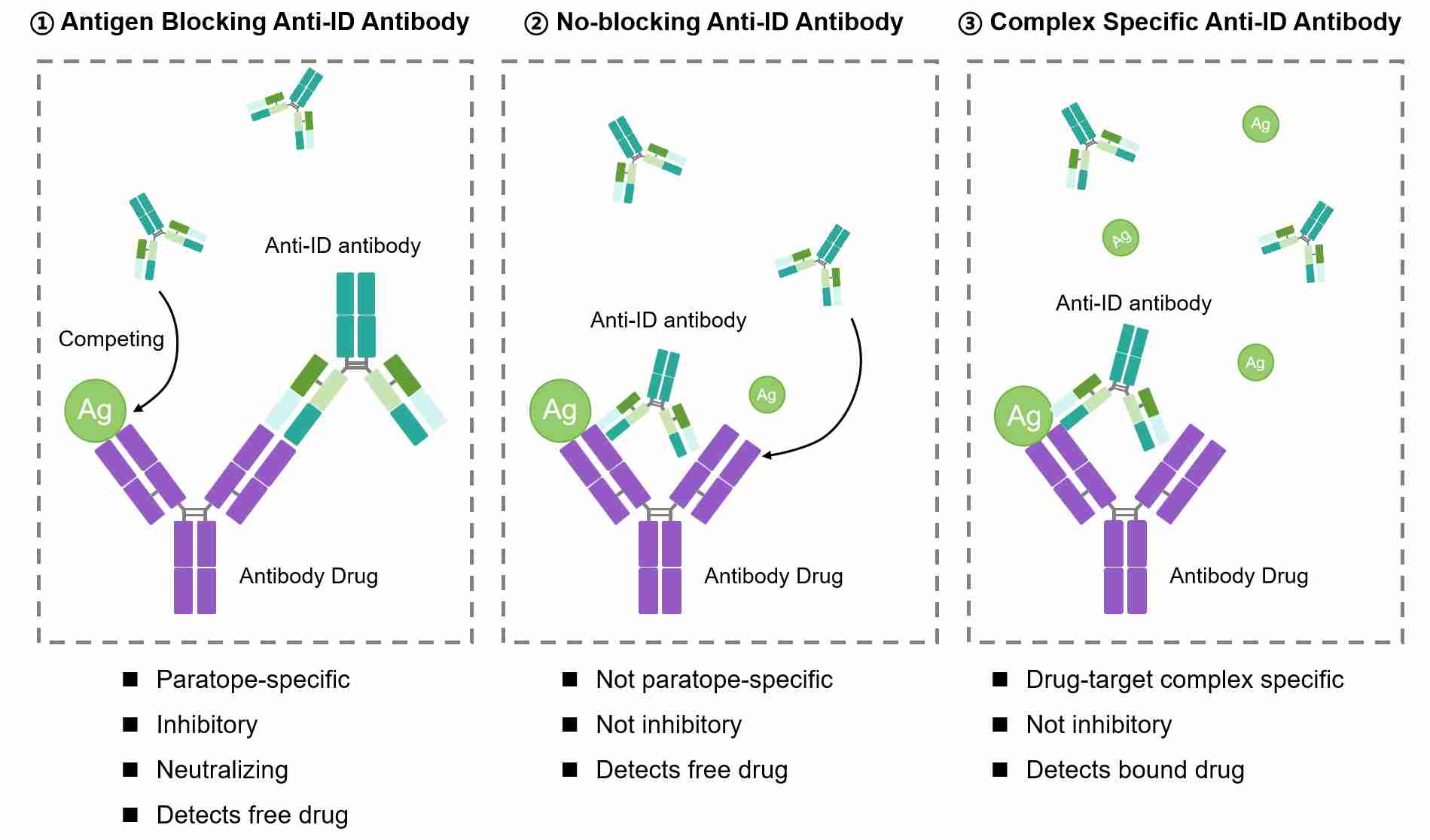Pharmacokinetic (PK) Bridging ELISA Measuring Total Drug
Bridging ELISA
Bridging enzyme-linked immunosorbent assay (ELISA) is a special case of a sandwich ELISA in which the antigen (most often an antibody in the human serum sample) is detected by the capture and detection antibody. The antigen bridges the two specific antibodies. Bridging ELISAs are most frequently used for the detection of IgG in pharmacokinetic (PK) or anti-drug antibody (ADA) assays. In bridging assay, the unlabeled antibody is first immobilized onto the microtiter plate wells, and optimally diluted antibody in a test serum sample are allowed to bind, followed by the usual washing step to remove unbound antibody. Enzyme-labeled antibody is then added to complete the bridge, and the substrate is then added to detect the presence of specific antibody drug.
Advantages of the bridging ELISA
- The capability to detect antibodies regardless of their isotype or the species of origin.
- Reducing background readings by using fewer amplification steps.
- The requirement for two specific binding events for the target drug increases the specificity of the assay.
Anti-Idiotype Antibodies
An idiotope is the unique set of antigenic determinants (epitopes) of the variable portion of an antibody. An anti-idiotypic (anti-ID) antibody binds to the idiotope of another antibody, usually an antibody drug, which makes it a very powerful tool for antibody drug development, especially for immunogenicity and PK analysis. In this case, the anti-ID is specific to the monoclonal therapeutic and/or its biosimilar. Based on different properties and binding modes, anti-ID antibodies can be classified into the following three types.
- Type 1: Type 1 anti-ID antibody is antigen blocking specific which binds to the paratope of the therapeutic antibody and competes with its target antigen. Therefore, this format of anti-ID antibody will only detect free antibody drug. Click here for Pharmacokinetic (PK) Bridging ELISA Measuring Free Drug.
- Type 2: Type 2 anti-ID antibody is non-blocking specific which binds near the paratope but still allows the antibody to bind its target antigen. This antibody is not inhibitory and thus can be used to detect both free and bound drug in serum. Using a combination of the different types of drug-specific anti-IDs offers the assay developer enhanced flexibility and better overall information about the availability and the state of the antibody drug candidate. Click here for Protocol of Pharmacokinetic (PK) Bridging ELISA Measuring Total Drug and Troubleshooting of Pharmacokinetic (PK) Bridging ELISA Measuring Total Drug.
- Type 3: Type 3 anti-ID antibody is complex specific anti-IDs which only binds specifically the antibody-target complex but not the unbound antibody or the unbound target. This type of anti-ID antibody is only able to measure target bound drug.
 Fig.1 Types of anti-ID antibodies.
Fig.1 Types of anti-ID antibodies.
Why use anti-IDs?
- Ideal for pre-clinical research and antibody drug development studies
- Allow monitoring of therapeutic Abs in samples
- Allow detection of Ab biotherapeutics that closely resemble circulating human immunoglobulin (Ig)
Anti-ID Antibodies and PK Assays
Because most anti-ID antibodies are generated against a specific antibody drug, they are normally used in preclinical practices for PK analysis. PK is the study of drug metabolism throughout the body. Specifically, researchers will determine the rate of drug absorption, distribution, bioavailability, and excretion in various cohorts of patients. In order to accomplish this, scientists need to be able to track antibody drugs which are bound or unbound to their designated target at various time points.
By using anti-IDs, various forms of antibody therapeutics can be easily tracked and quantified in patient urine, serum, blood or other bodily fluids. Four common ways of performing an ELISA based PK assays are shown in Figure 2. The schematic diagram of the experiment PK bridging ELISA measuring total drug is the second type Anti-ID Bridging shown in Figure 2. Different from measuring free drug, the anti-ID antibodies used in PK bridging ELISA measuring total drug are non-inhibitory and enable the measurement of total drug – free, partially and fully bound.
 Fig.2 Types of ELISA-based PK assays.
Fig.2 Types of ELISA-based PK assays.
As a leading service provider of anti-ID antibody development, Creative Biolabs offers PK bridging ELISA technique for measuring total drug in tested sample to advance your drug development process. Click here for Troubleshooting of Pharmacokinetic (PK) Bridging ELISA Measuring Total Drug.
